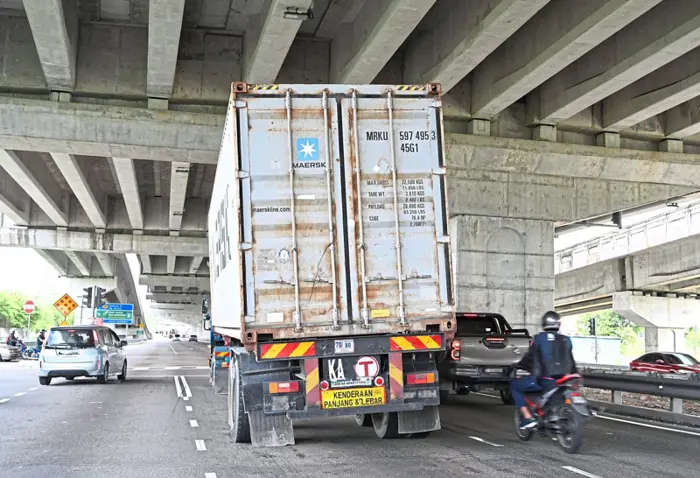KUALA LUMPUR: Five trade associations representing around half of Malaysia’s heavy vehicle owners and operators are asking the government to reconsider the restricted hours for heavy vehicles on three major expressways.
In a press conference here yesterday, they said the move had made life very difficult for the logistics industry.
They urged the Transport Ministry and relevant authorities to reconsider lifting the ban that took effect on Feb 19, or introduce appropriate mitigation measures such as exemptions for high-priority cargo.
The groups are the Association of Malaysian Hauliers (AMH), Malaysia Trucking Federation (MTF), Malaysia Tipper Lorry Operators Association (MTLOA), Malaysia Mobile Crane Owners Association and Persatuan Usahawan Logistik Semenanjung Malaysia.
In appealing for meaningful dialogue with industry stakeholders, the operators said addressing traffic congestion is a huge undertaking that must have a comprehensive move, beyond restricting heavy vehicles from the roads.
“The restriction was formulated and gazetted without prior consultation, greatly affecting the logistics industry, which is the driver of the national economy.
“In other (developed) countries, restrictions are applied more to private vehicles,” said MTF president Datuk Ng Koong Sinn.
His views were echoed by AMH president Soo Chee Yeong, whose association represents 70% of container hauliers in Malaysia, or practically everyone trucking containers in and out of Port Klang.
“The latest peak hour restrictions on the Duta-Ulu Klang Expressway (Duke) and Elite (Ekspresway Lingkaran Tengah) have significantly disrupted the container logistics industry, as Duke is a key route to the east coast of the peninsula, while Elite is an important route to KL International Airport and the south.
“The restrictions have caused drivers to rush to avoid restricted hours, which raises the risk of accidents,” added Soo.
AMH represents 15,000 trucks in the peninsula that collectively move 500,000 containers monthly.
For Soo, alternative routes in the southern Klang Valley corridor would see trucks running through towns and villages like Nilai in Negri Sembilan and Olak Lempit in Kuala Langat, Selangor.
“These routes traverse many villages, schools and hospitals, and create their own set of problems there,” he said, adding that inadequate rest areas at expressways and Puspakom inspection centres exacerbate the problems faced by the industry.
Other restrictions the operators have to juggle include capping working time for drivers to 12 hours a day (a statutory requirement) and also getting their vehicles inspected twice a year at Puspakom, which is not smooth sailing due to the limited number of centres and booking slots.
Datuk Michael Loo, president of MTLOA, said with Ramadan and Hari Raya Aidilfitri around the corner, the logistics industry is under immense pressure to juggle all the clashing expectations and at some point, something may have to give, such as passing on the additional costs to consumers.
His views were echoed by AMH president Soo Chee Yeong, whose association represents 70% of container hauliers in Malaysia, or practically everyone trucking containers in and out of Port Klang.
“The latest peak hour restrictions on the Duta-Ulu Klang Expressway (Duke) and Elite (Ekspresway Lingkaran Tengah) have significantly disrupted the container logistics industry, as Duke is a key route to the east coast of the peninsula, while Elite is an important route to KL International Airport and the south.
“The restrictions have caused drivers to rush to avoid restricted hours, which raises the risk of accidents,” added Soo.
AMH represents 15,000 trucks in the peninsula that collectively move 500,000 containers monthly.
For Soo, alternative routes in the southern Klang Valley corridor would see trucks running through towns and villages like Nilai in Negri Sembilan and Olak Lempit in Kuala Langat, Selangor.
“These routes traverse many villages, schools and hospitals, and create their own set of problems there,” he said, adding that inadequate rest areas at expressways and Puspakom inspection centres exacerbate the problems faced by the industry.
Other restrictions the operators have to juggle include capping working time for drivers to 12 hours a day (a statutory requirement) and also getting their vehicles inspected twice a year at Puspakom, which is not smooth sailing due to the limited number of centres and booking slots.
Datuk Michael Loo, president of MTLOA, said with Ramadan and Hari Raya Aidilfitri around the corner, the logistics industry is under immense pressure to juggle all the clashing expectations and at some point, something may have to give, such as passing on the additional costs to consumers.
“The snowball effect could severely hurt the economy, disrupt supply chains and impact the timely delivery of goods during this critical period,” he added.
Reference : https://www.thestar.com.my/news/nation/2025/02/22/heavy-vehicle-ban-drives-down-logistics-industry

